Chapter 2.6 Money
Chapter 2.6 Money
Textbook Questions and Answers
Question 1.
Discuss in the class about ‘Importance of money.’
Points :
(a) Money is used as capital in business.
(b) It is used by traders to Jill up stocks
(c) It is used by the common man for buying essentials/necessities.
(d) Everyone uses money for paying transport fare/ food-bill/wages and so on.
Question 2.
Complete the web: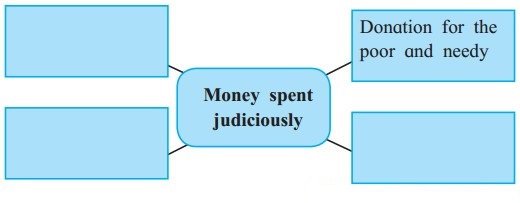
Answer: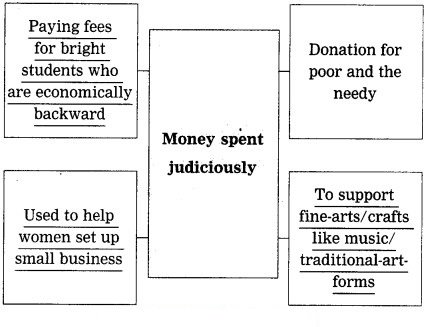
Question 3.
Make a list of the good qualities of your friend.
Answer:
(a) Calm and good tempered at all times
(b) Helpful and concerned about anyone in trouble
(c) Quick to intervene/calm down any situation that could become unpleasant
(d) Very simple and down to earth in spite of coming from an extremely wealthy background
Question 4.
Share your views on ‘Money is the root of all evils’.
Answer:
Points:
- Money is a resource.
- Resources should be available/ used in times of need
- Money is accumulated by few people/others in need are deprived/some people are not paid fully/workers are paid less for their time and energy
- Employer gets profit/ imbalance of resources
- Imbalance in wealth causes discontent among disadvantaged sections of society.
- Crime increases
- Haves are targeted by have-nots
- Normal life becomes unstable
- Accumulation of money causes this upset in society
- So important resource becomes reason for evil
Question 5.
Do you lend money to your friend? Give reasons:
Answer:
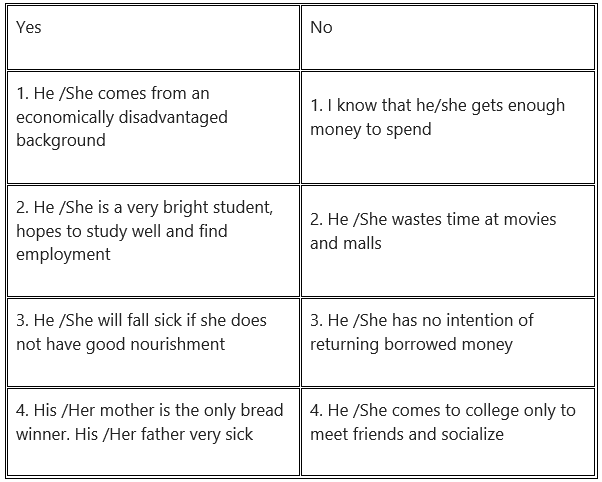
(A1)
Question (i)
‘Money does not mean everything in life’. Justify the statement by giving examples. Take help of the following points:
(a) Money cannot give you eternal happiness.
(b) Art, music and literature can give you unending happiness.
(c) Money is short-lived.
(d) Money cannot purchase happiness and contentment.
Answer:
Happiness is in the mind. If a person is satisfied with what is on hand then he is happy. Rich clothes, gold, expensive food, servants may all be available. But the owner of these may still be sad and lonely.
Some are happy to make music another may create art or write. They may not have material possessions. But in their hearts they are happy to do what they love.
Money is only a medium to purchase our needs. One cannot give money and buy a bag of joy. Joy is in the heart. Money can be stolen. But joy cannot be stolen. One can earn money but not happiness. No amount of money will satisfy greed or buy happiness.
Question (ii)
Debate on the following topic in groups : Money is the solution for everything For: We need money for – Food-Clothes-Medicines- Education- Travel
Against: One cannot eat money itself/one must have food. We should not buy more than essential clothes/ no need to buy often-Good hygiene and food-habits will ensure health-Government schools are available- Travel is not needed for survival.
(A2)
(i) State whether the following statements are True or False.
Question (a)
The poet knew no joy till he was rich.
Answer:
False. The poet had no joy as long as he was rich. He was happy when he was poor.
Question (b)
The poet felt that he should talk about his poverty.
Answer:
False. He could not talk about his money.
Question (c)
When the poet had money, he had many true friends.
Answer:
False. When the poet had money, all his friends were false ones.
Question (d)
When poet became poor he had very few real friends.
Answer:
True.
(ii) Write reasons for the following statements.
Question (a)
Friends came knocking all day at the poet’s door.
Answer:
When the poet was rich he had many callers. They claimed they were friends. They were being friendly because he had money. They were not true friends. Such people are called ‘fair-weather friends’.
Question (b)
Poor men’s wives hum like bees.
Answer:
Poor men have no worries. They do not have to safeguard their wealth from liars and cheats. They don’t have false friends who actually love his money and not him. When a man is satisfied with what he has he is happy. He is not chasing wealth and or pretending. The wives are busy and do not have the time to wish for fancy things or gossip. So a happy man has a happy busy wife.
Question (iii)
Money makes the world go round. Explain it in the light of the poet’s experience.
Answer:
Money makes the world go round is a popular saying. It means money is the most important thing in the world. But in ‘Money’, the poet does not accept this view. He had money but he could not say that he possessed it. There were many insincere men who said they were friends.
Contentment is the main thing for being happy, not worldly possessions. Lack of money is a problem. We need it for things like health or education. When all needs are taken care of, then excess money is not necessary. Money is needed in life but it is not the only important thing in life.
The poet repeats that money brought many false men to be near him. But in poverty only a few true friends were with him.
Question (iv)
Poor men need not go up so much as rich men should come down. Express your views regarding this statement.
Answer:
Poor men need not go up as rich men should come down. This statement is perfectly true. The poor will survive. Living a simple, real life, and working hard. They are happy with necessities which may not be expensive. They are content and that brings happiness. They do not have to worry about safeguarding the excess.
But the rich may not know how to live simply, just with basic necessities. They may have servants to do basic chores. They travel in style and sometimes for no reason. They spend unnecessarily. So the poor need not go up as much as the rich need to come down is true.
(A3)
Question (i)
Find out meanings of the phrases given below and use them in your own sentences:
Answer:
(a) Be in the money –
Meaning: to suddenly have a lot of money.
Sentence: It looks he is in the money, by the way he is giving everyone costly gifts.
(b) Win lots of money –
Meaning: get money in a lottery/ gambling/ get money through luck, not work.
Sentence: He bought a lottery ticket every week hoping to win lots of money.
(c) For my money –
Meaning: in exchange for. Worth the amount.
Sentence: The old man asked. ‘Is this all I’m getting for my money?’
(d) Money for old rope –
Meaning: money that is easily earned or gotten
Sentence: She got two thousand just for answering questions in the interview! Money for old rope!
(e) Put one’s money where one’s mouth is Meaning: to take appropriate action to support what one has said.
Sentence: The Municipal Commissioner promised he would put the money where his mouth is and immediately release funds for the school facilities as promised.
Question (ii)
Complete the crossword with the help of the clues from the poem :
Across:
1. A brass musical instrument – TRUMPET
2. A low steady continuous sound – HUM
3. False – UNTRUE
4. Say Something – SPEAK
Down :
5. Not imaginary – REAL
6. Ponder – THINK
7. Stinging insects – BEES
8. In large number – MANY
9. Strike a surface noisily – KNOCK
(A4)
Question (i)
Complete the following table:
Answer:
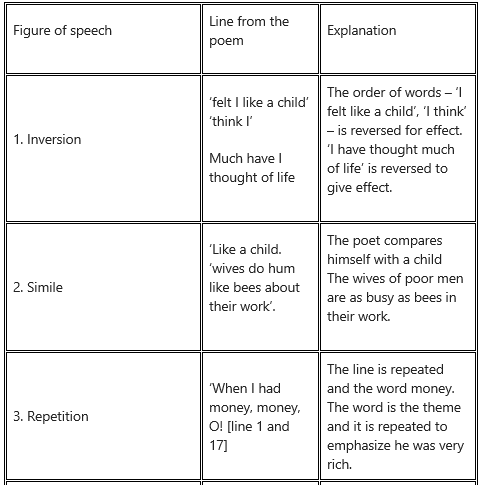
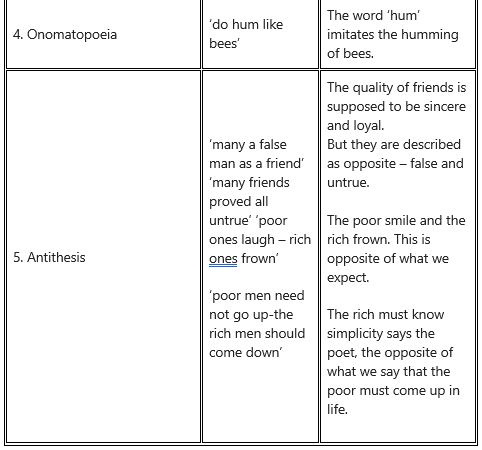
Question (ii)
Identify the rhyme scheme of all the stanzas of the poem.
Answer:
The rhyme scheme of the stanzas 1 to 4 is abcb.
The rhyme scheme of the 5th stanza is abab.
Question (iii)
Compose a short poem on ‘Friendship’.
Answer:
‘Friendship’
We knew playtime in the park
Study time in school.
We helped one another
Struggling for each difficult mark.
We grew up, and though we fought
We will meet years later
We fondly thought.
(A5)
Question 1.
Write an appreciation of the poem considering the following points:
- About the poem/poet/title
- Theme
- Poetic devices, language, style
- Special features-tone and type
- Values, message
- Your opinion about the poem
Answer:
William H. Davies – a Welsh poet and writer – in his poem ‘Money’ speaks of both times – when he had money and when he did not. Davies tramped through the United Kingdom and the United States.
So he actually led a poor simple life of a wanderer. He actually experienced the difference in the life of a rich man and a poor one. The theme of the poem is the effect of money on the behaviour of people. False friends are plenty when a man has money. The poet compares himself to a child with a trumpet. He is not allowed to blow it for there has been a death.
He uses simile again when the poor man’s wife is described as humming about busily like a bee. The poet also has seen that the lack of money does not mean lack of happiness. The poor man is able to laugh while a rich man frowns; he feels the rich must become poor to taste the simple joys of life – the use of antithesis helps to stress this point.
The poem has five stanzas of four lines each, The seven or eight syllable lines are short but rich ; in poetic devices. The rhyme scheme lends rhythm. Repetition of the word ‘money’ stresses the way man gives money too much importance when it actually takes away our happiness.
The message is that money does not bring happiness. The poor are cheerful while the rich are worried. The poem is very useful to remind us the value of money. It is a necessity. It is not the only thing to chase.
(A6)
Question (i)
Visit a library and read a few poems written by William H. Davies.
Question (ii)
There are many career opportunities related to finance and planning.
Question (iii)
Try to get information about the following careers by surfing the internet.
(a) Finance Management
(b) Banking and Finance
(c) Actuaries
(d) Economics
(e) Share Market
(f) Accountancy
(g) Company Secretary
Question (iv)
Economics is a very important subject in which you can pursue vour career. Browse the websites of these institutions and get information for various courses in Economics.
(a) Delhi School of Economics
(b) Indian Statistical Institute
(c) Gokhale Institute of Politics and Economics, Pune
(d) Madras School of Economics
Interpretation/Inference/Analysis:
Question 1.
Complete the reasons:
Poor ones laugh because ………………
Answer:
Poor ones laugh because – poor people live a simple life. If the basic needs are fulfilled the poor man is happy. He has nothing to worry about or fear. When a man has wealth he has to safeguard it. The poor man is worry-free like health or education. When all needs are taken care of, then excess money is not necessary. Money is needed in life but it is not the only important thing in life. The poet repeats that money brought many false men to be near him. But in poverty, only a few true friends were with him.